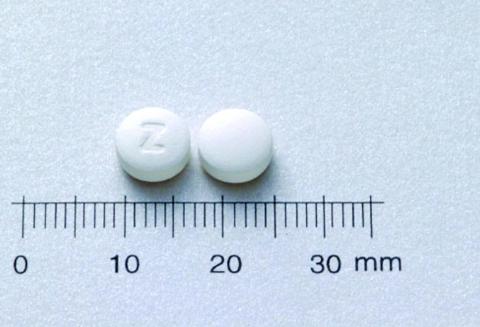The Ministry of Health and Welfare yesterday said that it is launching an investigation into stomach medicine containing ranitidine, which is marketed under the trade name Zantac, after a tip-off from the US Food and Drug Administration and the European Medicines Agency that it might contain a carcinogenic substance.
The ministry had been advised that Zantac, which is manufactured by UK-based GlaxoSmithKline PLC, could contain traces of N-Nitrosodimethylamine (NDMA), which is a probable carcinogen.
The ministry plans to complete a laboratory analysis by Oct. 18, Food and Drug Administration medicine section deputy head Wu Ming-mei (吳明美) said.

A screen grab from the Food and Drug Administration website
The US and European regulators have not yet ordered the drug to be withdrawn, as the NDMA content is minute and could be lower than ordinary NDMA intake from eating food, the agency said.
The US and European regulators are also still conducting risk assessments, Wu said.
More than 21 Taiwanese firms are producing drugs that include ranitidine, she said.
Citing National Health Insurance Administration (NHI) data, Wu said that the program uses about 80 million items containing ranitidine each year.
The investigation is prioritizing the drugs containing ranitidine that comprise the largest percentage of NHI funding, she said.
The administration has ordered all firms that use ranitidine to conduct immediate laboratory tests on the drugs currently on the market, she said.
All manufacturers must tender their laboratory test results before Oct. 18, Wu said.
Drugs that do not contain NDMA would be approved for continued manufacture and sale, she said.
Sales of drugs that have traces of NDMA exceeding 0.3 parts per million would be halted immediately, she added.
People concerned about their prescription drugs should raise the issue with their doctor or pharmacist, she said.

CARROT AND STICK: While unrelenting in its military threats, China attracted nearly 40,000 Taiwanese to over 400 business events last year Nearly 40,000 Taiwanese last year joined industry events in China, such as conferences and trade fairs, supported by the Chinese government, a study showed yesterday, as Beijing ramps up a charm offensive toward Taipei alongside military pressure. China has long taken a carrot-and-stick approach to Taiwan, threatening it with the prospect of military action while reaching out to those it believes are amenable to Beijing’s point of view. Taiwanese security officials are wary of what they see as Beijing’s influence campaigns to sway public opinion after Taipei and Beijing gradually resumed travel links halted by the COVID-19 pandemic, but the scale of

TRADE: A mandatory declaration of origin for manufactured goods bound for the US is to take effect on May 7 to block China from exploiting Taiwan’s trade channels All products manufactured in Taiwan and exported to the US must include a signed declaration of origin starting on May 7, the Bureau of Foreign Trade announced yesterday. US President Donald Trump on April 2 imposed a 32 percent tariff on imports from Taiwan, but one week later announced a 90-day pause on its implementation. However, a universal 10 percent tariff was immediately applied to most imports from around the world. On April 12, the Trump administration further exempted computers, smartphones and semiconductors from the new tariffs. In response, President William Lai’s (賴清德) administration has introduced a series of countermeasures to support affected

Pope Francis is be laid to rest on Saturday after lying in state for three days in St Peter’s Basilica, where the faithful are expected to flock to pay their respects to history’s first Latin American pontiff. The cardinals met yesterday in the Vatican’s synod hall to chart the next steps before a conclave begins to choose Francis’ successor, as condolences poured in from around the world. According to current norms, the conclave must begin between May 5 and 10. The cardinals set the funeral for Saturday at 10am in St Peter’s Square, to be celebrated by the dean of the College

CROSS-STRAIT: The vast majority of Taiwanese support maintaining the ‘status quo,’ while concern is rising about Beijing’s influence operations More than eight out of 10 Taiwanese reject Beijing’s “one country, two systems” framework for cross-strait relations, according to a survey released by the Mainland Affairs Council (MAC) on Thursday. The MAC’s latest quarterly survey found that 84.4 percent of respondents opposed Beijing’s “one country, two systems” formula for handling cross-strait relations — a figure consistent with past polling. Over the past three years, opposition to the framework has remained high, ranging from a low of 83.6 percent in April 2023 to a peak of 89.6 percent in April last year. In the most recent poll, 82.5 percent also rejected China’s